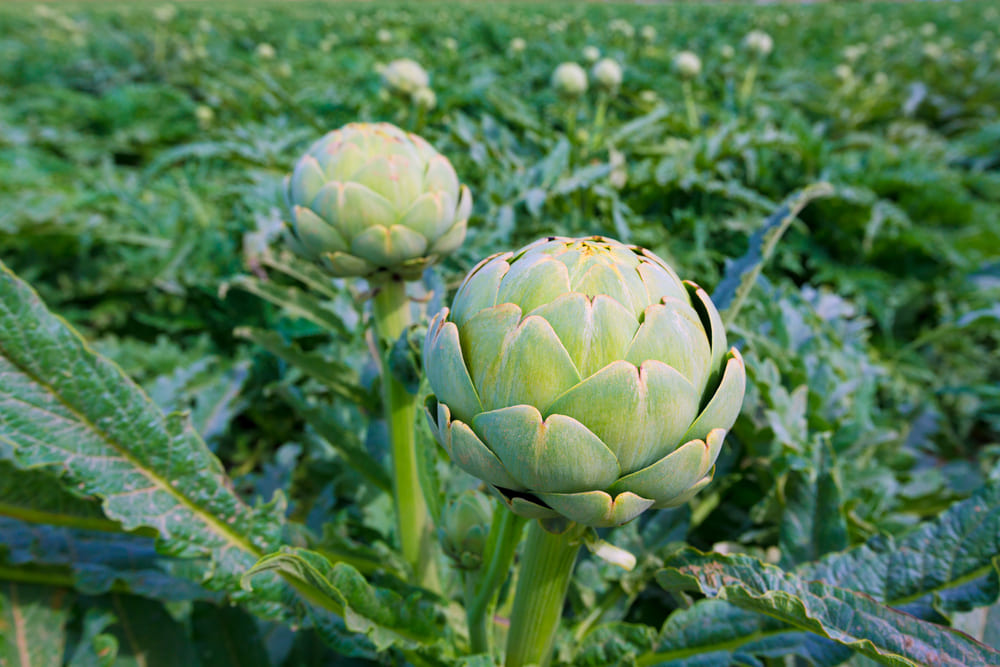Artichokes are a flavorful and nutritious vegetable that can add a unique touch to any dish. If you are planning to grow them in your garden, it is important to know what plants to avoid planting near them.
Companion planting can also play a big role in the success of your artichoke crop. Here is a guide to help you understand what you can and cannot plant with artichokes.
What are the Best Companion Plants for Artichokes?

Planting Companions for Artichokes
Artichokes can make great companions for other plants that like similar conditions. Jerusalem artichokes, for example, are a great companion plant for artichokes because they both thrive in full sun and require similar soil conditions.
Other flowering plants like yarrow and calendula can also help repel pests and attract beneficial insects to your garden bed.
Vegetable Companion Plants for Artichokes
There are several vegetables that can be planted near artichokes with great success. Asparagus, for example, can make a great companion plant because it also prefers alkaline soil and full sun.
Lettuce and other leafy greens are also great to plant next to artichokes because they can utilize the nutrients in the soil that the artichokes do not use.
Perennial Companion Plants for Artichokes
Perennial plants like sage, thyme, and oregano can make great companions as well. Not only do they need similar growing conditions, but they also have the added benefit of repelling pests and providing aromatic scents to your garden.
What Should You Avoid Planting with Artichokes?
Bad Companion Plants for Artichokes
While there are many great companions for artichokes, there are also plants that should be avoided when planting next to them. Two plants that should not be planted next to artichokes are fennel and potatoes.
Fennel can stunt the growth of the artichokes and potatoes can attract harmful pests that can damage the artichoke crop.
Plants that Need a Lot of Space
When planting artichokes, it is important to consider the amount of space needed for them to grow properly.
Plants like pumpkins and squash should be avoided because they require a lot of space and can take over the area where the artichokes are growing.
Plants that Grow Poorly with Artichokes
Plants like beans, peas, and tomatoes should also be avoided when planting near artichokes. These plants require a different pH level and nutrient balance than the artichokes, and planting them together may result in poor growth for both crops.
What are Some Plants that Can Be Planted Near Artichokes?
The Benefits of Planting Marigolds with Artichokes
Marigolds are a great companion plant for artichokes because they repel harmful insects and attract beneficial ones. They also add a beautiful pop of color to your garden bed.
Companion Plants for Asparagus and Artichoke
Asparagus and artichokes make great companions because they prefer alkaline soil and full sun. This means that they can thrive in the same garden bed without competing for nutrients.
Other plants that can be planted near artichokes include garlic, onions, and chives.
Other Vegetables that Can Be Planted Near Artichokes
Other vegetables that can be planted near artichokes include broccoli, Brussels sprouts, and cauliflower. These plants are part of the Brassica family like artichokes, and they all have similar growing conditions.
What Conditions Do Artichokes Need to Grow?
The Importance of Full Sun for Artichokes
Artichokes need plenty of sunlight in order to grow properly and produce a good harvest. They should be planted in a location that receives at least 6-8 hours of direct sunlight per day.
Pest Control for Artichoke Plants
Artichoke plants can attract several pests, such as aphids, slugs, and snails. To protect your artichoke crops, be sure to plant companion plants that can repel these pests.
You can also use organic pest control methods like handpicking or spraying with a mixture of water and dish soap.
Proper Spacing for Artichoke Plants
Artichoke plants can grow quite large, so it is important to give them enough space to spread out. They should be planted about 4-6 feet apart in rows that are at least 6-8 feet apart.
How Easy Is It to Grow Artichokes?
Tips for Growing Artichokes in a Vegetable Garden
While artichokes do require some specific growing conditions, they can be relatively easy to grow.
You can start your artichokes from seeds or transplants, and they should be planted in a location that receives full sun. Regular watering and fertilization will also help them thrive.
Artichoke Plant Spacing and Garden Space Requirements
Artichokes do require a significant amount of space to grow, so it is important to plan accordingly.
They should be planted in a garden bed that is at least 3 feet wide and 6-8 feet long. Be sure to also give them plenty of space between each plant to allow for proper growth.
Why Artichokes Are an Easy Vegetable to Grow
Despite their specific growing requirements, artichokes are actually quite easy to grow in the right conditions.
They are a perennial plant, meaning that with proper care, you can enjoy a harvest year after year. They are also relatively low-maintenance, requiring only occasional fertilization and pruning.
Conclusion
When planning your garden and deciding what to plant next to your artichokes, it is important to consider the plants’ companionship requirements. While there are several great companion plants for artichokes, like Jerusalem artichokes and marigolds, there are also plants that should be avoided, like fennel and potatoes.
By following these guidelines, you can ensure a successful artichoke crop and a bountiful harvest for years to come!
